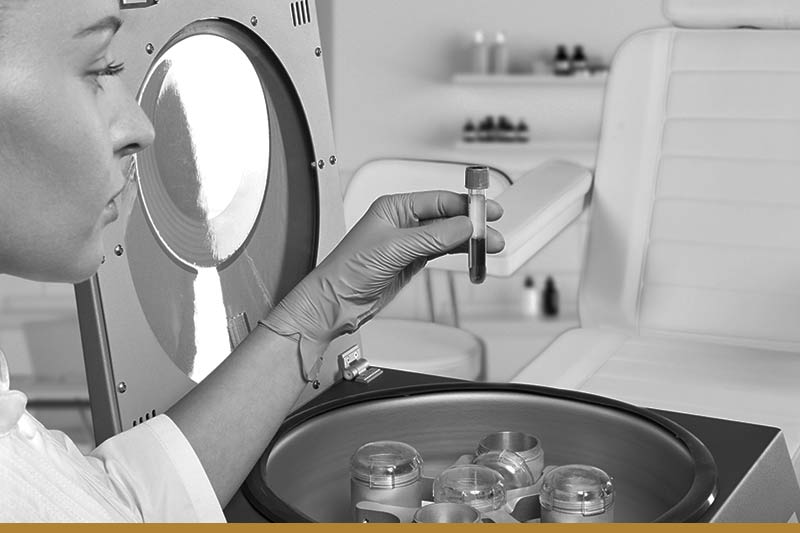Testosterone is a hormone typically associated with the development and maintenance of male characteristics. In men, it plays multiple roles, such as the development of male sex organs, a deeper voice, facial hair, muscle and bone growth, and sex drive. However, this androgen impacts overall physical health and emotional wellbeing in men and women.
Imbalanced testosterone levels can provoke or worsen many health conditions. A total testosterone test is a valuable diagnostic tool for discovering the underlying cause behind these conditions.
This article explains what total testosterone tests help determine and why they may be significant for you.

A total testosterone test measures blood hormone levels. Most circulating testosterone is bound to proteins, while 0.5-3% remains unbound (free) and bioavailable.
A total testosterone test measures three testosterone types:
Other tests include a free testosterone test (which measures only the active form) and a bioavailable testosterone test (which measures free testosterone and the albumin-bound type). These tests are less common but may be help diagnose certain medical conditions.
Note: Read our article on free vs. total testosterone and find out how they differ.
This test helps determine testosterone levels in adult men and women. It also helps to diagnose early or delayed puberty in children, teenagers, and adolescents.
Both suboptimal and excessive testosterone production can cause or worsen many medical conditions. Your primary healthcare provider may recommend this test if any of the following symptoms apply to you.
| Men – Testosterone Levels | |
| High | Low |
| Acne Insomnia High blood pressure Excessive facial and body hair Infertility Aggression Prostate enlargement Headaches Increased appetite Unexplained weight gain | Low libido Hormonal weight gain Depression Anxiety Hair loss Brain fog Reduced muscle mass Irritability Development of breast tissue Erectile dysfunction Difficulty concentrating |
| Women – Testosterone Levels | |
| High | Low |
| Polycystic ovary syndrome (PCOS) Infertility Obesity Hormonal acne Hirsutism (excess facial or body hair) Voice deepening Increased risk of type 2 diabetes | Low sex drive Bone loss Reduced muscle mass Fatigue Insomnia Hair loss Irregular periods Vaginal dryness |
Note: Learn how testosterone therapy helps women and what to expect from the treatment.
A total testosterone test is a key indicator of overall testosterone levels in the body. It measures bound and unbound (free) testosterone in the bloodstream and helps to determine the link between abnormal testosterone levels and one’s health condition.
The test is helpful in early diagnosis as it can indicate the following:
Note: Learn about testosterone therapy’s benefits, such as improved sex drive, weight loss, and increased energy.
Testing is typically performed between 7 am and 10 am, when testosterone levels are at their highest. There is no need to prepare for testing unless your medical provider tells you otherwise. Some doctors recommend fasting, during which patients avoid eating and drinking anything but water for several hours before taking the test. You should avoid strenuous physical activities, drinking alcohol, and smoking for 24 hours before testing to avoid hormonal disruption.
Ask your medical provider for specific instructions and inform them about all the supplements, herbs, and medication you are currently taking, including both prescription and over-the-counter drugs.
The doctor or a nurse will place an elastic band called a tourniquet around your upper arm and clean the injection site with an antiseptic to prevent infection. They will draw blood from a vein inside your elbow using a thin, sterile needle that transfers the sample into a small vial. The doctor will remove the tourniquet and cover the site with a cotton ball or a bandage to stop bleeding.
The entire process lasts less than a minute. You might feel a slight pinch or a sting as the needle is inserted and removed.

Test results vary depending on your age, gender, and health conditions. To obtain accurate results, your doctor may recommend retaking the test on different days or at separate times of the day.
According to MedlinePlus, an optimal range given in nanograms per deciliter (ng/dL) is as follows:
Patients usually receive the results via mail or an online health portal within several days. Optimal value ranges may vary slightly among different laboratories, and each laboratory has a corresponding reference range for a healthy person depending on age and gender. Your doctor will tell you whether your results are within a healthy range in your specific case.
A testosterone test alone does not diagnose any health condition, but it may indicate an underlying issue. You should schedule a follow-up visit with your doctor to discuss the results and next steps. You might need to take additional blood tests to check other hormone levels.
The results can be affected by any of the following:
Potential risks and side effects are minimal and temporary. They include:
You can check your testosterone levels with an at-home test kit that allows you to collect a blood or saliva sample and send it to a lab for testing. These kits are available without a prescription.
While at-home tests offer convenience and can be useful for initial screening, it is important to note that a physician-ordered blood test is the gold standard for accuracy and reliability.
The total testosterone test cost range in the United States is $17 to $149. The pricing varies depending on the clinic’s location, expertise, and your medical insurance policy.
Some clinics include a consultation and a follow-up visit in the price. Before scheduling an appointment, consult your healthcare provider about additional services and consultation fees.
Testosterone levels decline with age and vary among men and women. A total testosterone test is the most common and comprehensive test used for diagnostic and monitoring purposes. It helps to determine whether your current health concern is linked to this androgen and is the first step in resolving your health issues.
Our friendly Vibrant Vitality Clinic staff can help you learn more about testosterone and other hormones.




4325 E Indian School Rd, Suite 130
Phoenix, AZ 85018
United States
(480) 422-2058
info@vibrantvitalityclinic.com
Monday - Friday: 9:00 am - 6:00 pm
Saturday: 9:00 am - 3:00 pm
Sunday: Closed
